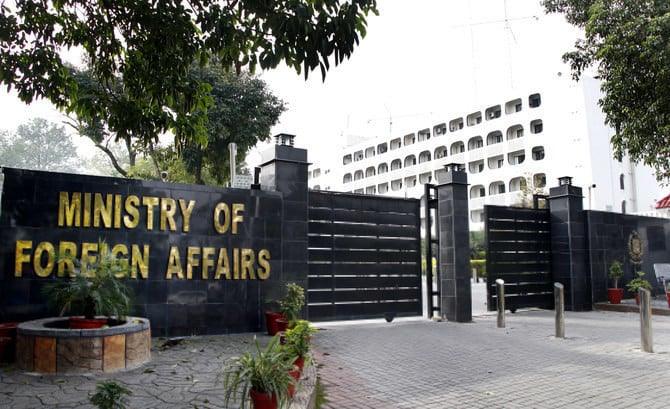Pakistan strongly condemned the remarks made by Indian Minister of Defense Rajnath Singh concerning the surveillance of the Pakistan nuclear arsenal, calling them “irresponsible and deceptive”.
FO’s declaration was made after Indian Defense Minister Rajnath Singh said Pakistan nuclear weapons should be placed under the supervision of the United Nations International Atomic Energy Agency (IAEA).
Responding to the declaration, the spokesman for the Ministry of Foreign Affairs, Shafqat Ali Khan, rejected comments, describing them as reflecting “insecurity and deep frustration” on the conventional military capacities of Pakistan, which, according to him, were sufficient to dissuade the Indian aggression without worrying about nuclear threats.
Khan also criticized Rajnath Singh’s understanding of international nuclear surveillance mechanisms, declaring that his comments have shown “ignorance of the mandate and responsibilities” of a specialized United Nations agency like the IAEA.
The FO spokesperson has raised concerns about India’s history of nuclear security, citing several flight incidents and illegal possession of radioactive materials in recent years.
He referenced specific incidents, including a reported flight from the Bhabha Atomic Research Center (Barc) and the Californium seizure, a highly radioactive substance, in Dehradun.
“Last year, five people with a radioactive system were stolen at the Bhabha Atomic Research Center (Barc) were found in Dehradun, India.”
“These incidents suggest the existence of a black market for sensitive double-use materials in India,” said the FO spokesperson, urging the international community and the IAEA to investigate in-depth.
The last escalation between Pakistan and India began on April 22, when an attack in the pahalgam seaside resort of the Iiojk killed 26 people. India immediately blamed Pakistan for the incident, despite no public evidence.
In response, India has undertaken a series of hostile actions the next day on April 23, including the suspension of the 65-year-old Industry Water Treaty (IWT), canceling visas for Pakistani citizens, closing the border crossing of Wagah-Attari, ordering the closure of the Pakistani High Commissioner in New Delhi and reducing diplomatic staff in the embassies of Pakistan.
Pakistan firmly rejected the accusation, calling it not supported, but has taken reciprocal measures through its National Security Committee (NSC). These include the cessation of trade with India, the closure of the Pakistani airspace to Indian planes and other counters.
Tensions also degenerated in the early hours of May 7, when the missile strikes reached six cities in Punjab and Azad Jammu and Cashmire (AJK), destroying a mosque and killing dozens of civilians, including women, children and the elderly.
In a rapid military response, the armed forces of Pakistan have shot down Indian war planes, including three Rafale planes, widely considered as a key asset of the Indian Air Force. Over the next two days, India launched waves of Israeli manufacturing drones, which were also neutralized by the Pakistani army.
The confrontation was again intensified in the early hours of May 10, when India targeted several Pakistani air bases with missile strikes. In retaliation, Pakistan launched the Bunyan-a-Marsoos operation, damaging Indian military facilities, including missile storage sites, bases and other strategic targets.
On Saturday evening, US President Donald Trump announced that a cease-fire had been reached following intense diplomatic efforts overnight. A few minutes later, the agreement was confirmed separately by the Minister of Foreign Affairs of Pakistan Ishaq Dar and the Indian Minister of Foreign Affairs.




